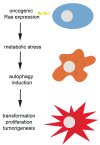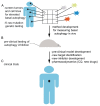Targeting autophagy addiction in cancer
- PMID: 22185891
- PMCID: PMC3282086
- DOI: 10.18632/oncotarget.384
Targeting autophagy addiction in cancer
Abstract
Autophagy inhibition is a novel cancer therapeutic strategy in the early stages of clinical trial testing. The initial rationale for using autophagy inhibition was generated by research revealing that autophagy is upregulated in response to external stresses, including chemotherapy and radiotherapy. Combining autophagy inhibition with agents that induce autophagy as a pro-survival response may therefore increase their therapeutic efficacy. Recent research has shown that some cancer cells, particularly those driven by the K-Ras oncogene, also depend on elevated levels of autophagy for survival even in the absence of external stressors. In multiple in vitro as well as in vivo systems, oncogenic Ras-mediated transformation and tumor growth are dependent on autophagy to evade metabolic stress and cell death. These studies have subsequently led to further early phase clinical testing whether autophagy inhibition is a viable and effective strategy for targeting Ras-driven tumors. Even before the clinical results are available from these ongoing clinical trials, much work remains to optimally develop the approach of autophagy inhibition clinically; most notably reliably detecting levels of autophagy in human tumor samples, pharmacodynamics of currently available autophagy inhibitors (chloroquine and the derivative hydroxychloroquine), and new target identification and drug development.
Figures


Similar articles
-
Blockage of Autophagy for Cancer Therapy: A Comprehensive Review.Int J Mol Sci. 2024 Jul 7;25(13):7459. doi: 10.3390/ijms25137459. Int J Mol Sci. 2024. PMID: 39000565 Free PMC article. Review.
-
The role of autophagy in cancer: therapeutic implications.Mol Cancer Ther. 2011 Sep;10(9):1533-41. doi: 10.1158/1535-7163.MCT-11-0047. Epub 2011 Aug 30. Mol Cancer Ther. 2011. PMID: 21878654 Free PMC article. Review.
-
Autophagy inhibition in cancer therapy: metabolic considerations for antitumor immunity.Immunol Rev. 2012 Sep;249(1):176-94. doi: 10.1111/j.1600-065X.2012.01141.x. Immunol Rev. 2012. PMID: 22889222 Review.
-
Chloroquine and hydroxychloroquine in antitumor therapies based on autophagy-related mechanisms.Pharmacol Res. 2021 Jun;168:105582. doi: 10.1016/j.phrs.2021.105582. Epub 2021 Mar 26. Pharmacol Res. 2021. PMID: 33775862 Review.
-
Regulation of autophagy and chloroquine sensitivity by oncogenic RAS in vitro is context-dependent.Autophagy. 2014 Oct 1;10(10):1814-26. doi: 10.4161/auto.32135. Epub 2014 Aug 13. Autophagy. 2014. PMID: 25136801 Free PMC article.
Cited by
-
Suppression of p53 potentiates chemosensitivity in nutrient-deprived cholangiocarcinoma cells via inhibition of autophagy.Oncol Lett. 2017 Aug;14(2):1959-1966. doi: 10.3892/ol.2017.6449. Epub 2017 Jun 21. Oncol Lett. 2017. PMID: 28789429 Free PMC article.
-
Autophagy inhibition of hsa-miR-19a-3p/19b-3p by targeting TGF-β R II during TGF-β1-induced fibrogenesis in human cardiac fibroblasts.Sci Rep. 2016 Apr 21;6:24747. doi: 10.1038/srep24747. Sci Rep. 2016. PMID: 27098600 Free PMC article.
-
Hydroxychloroquine in rheumatic autoimmune disorders and beyond.EMBO Mol Med. 2020 Aug 7;12(8):e12476. doi: 10.15252/emmm.202012476. Epub 2020 Jul 26. EMBO Mol Med. 2020. PMID: 32715647 Free PMC article. Review.
-
Metabolism addiction in pancreatic cancer.Cell Death Dis. 2014 Feb 20;5(2):e1065. doi: 10.1038/cddis.2014.38. Cell Death Dis. 2014. PMID: 24556680 Free PMC article. Review.
-
A DNA repair pathway score predicts survival in human multiple myeloma: the potential for therapeutic strategy.Oncotarget. 2014 May 15;5(9):2487-98. doi: 10.18632/oncotarget.1740. Oncotarget. 2014. PMID: 24809299 Free PMC article.
References
Publication types
MeSH terms
Substances
Grants and funding
LinkOut - more resources
Full Text Sources
Miscellaneous

